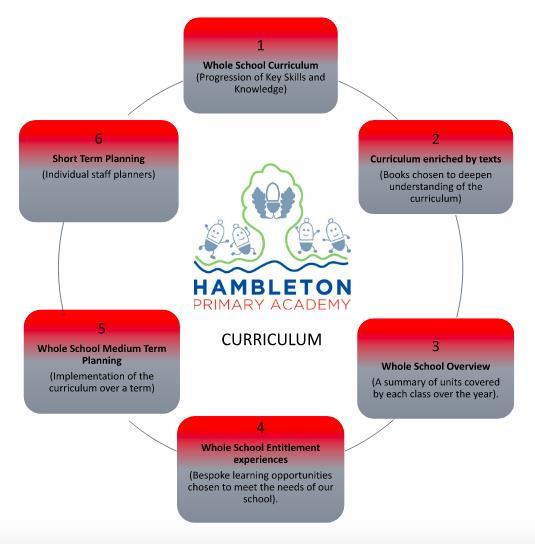 Progression of knowledge and skills
Progression of knowledge and skills
 Progression of knowledge and skills
Progression of knowledge and skills
Subject Implementation
Our Geography curriculum is designed so that planned progression is built into the key skills and knowledge to help children understand the world, the environments, places near and far and the processes that create or affect them. Our aim is to provide the children with a breadth of memorable experiences, to shape them into curious and considerate global citizens. By the time they transition into secondary school, they will be well equipped with the skills and knowledge to explore the world around them, to have a greater understanding of their planet and conduct thorough fieldwork enquiries. Our children will also develop knowledge of our community and locality through local visits to ensure that they not only appreciate and respect the area but they take stewardship of their surroundings.
Fundamental Great British Values:
We promote a respect for and understanding of different faiths, cultures and lifestyles. The spiritual, moral, social and cultural development of each child is central to everything that we do as a school and forms part of our school drivers of diversity, resilience, community and environment. This is evidenced through our comprehensive teaching and learning, our inclusive environment and through the many opportunities provided for our children to understand democracy, law, liberty, mutual respect and tolerance. At Hambleton Primary Academy, we understand clearly our responsibility in preparing children for their next stage of education and for the opportunities, responsibilities and experiences of later life, laying the foundations so that they can take their place successfully in modern British society. We teach our children to show mutual respect for the environment within our school and wider afield and teach global citizenship through a range of curriculum areas so that children understand how their actions can have an impact on the lives of others.
Planning:
Our Geography planning provides broad and balanced learning for all of our children, and we use a variety of teaching and learning styles in our geography lessons. We believe in whole-class teaching methods, and we combine these with enquiry-based research activities. We encourage children to ask as well as answer geographical questions, and they are free to challenge ideas and opinions through the debating of real life issues.
We offer children the opportunity to use a wide variation of data, such as maps, statistics, graphs, pictures, and aerial photographs. We facilitate the use of ICT in geography lessons where this serves to enhance and upskill their learning. Children take part in role-play and
discussions, they present reports to the rest of the class, and they engage in a wide variety of problem-solving activities. Wherever possible, we involve the children in ‘real’ geographical activities, for example, research of a local environmental problem, or use of online primary and secondary sources to investigate a current issue.
We recognise the fact that there are children of widely different geographical abilities in all classes, and we provide suitable learning opportunities for all children by matching the challenge of the task to the ability of the child. We achieve this by:
• setting tasks which are open-ended and can have a variety of responses;
• setting tasks of increasing difficulty and depth, unique to each individual child’s journey;
• providing resources of varying complexity, according to the support needed by the child;
• to challenge children to apply their knowledge to their own real-life experiences;
• using classroom assistants to support the work of individual children or groups of children.
Our curriculum is carefully planned using The National Curriculum, to engage and excite all of our learners, ensuring all children are taught progressive geographical skills and concepts. Geography lessons are adapted through additional support and challenge. In EYFS, children begin to develop their geographical knowledge through their study of ‘Understanding of the World- The Natural World’, ‘People, Culture and Communities’ and ‘Communication and Language.’ Children are provided with experiences that enable them to explore, observe and discuss things in their immediate environment, whilst looking at how environments might vary from one another. Children are encouraged to make observations of animals and plants, explain how/why some things occur, to discuss geographical changes, know some similarities and differences between the natural world around them and contrasting environments, and to draw information from a simple map.
These types of experiences include:
• Visits to the surrounding area- shops and parks
• Continuous provision experiences linked to different seasons, eg: autumn objects to explore or the winter climate (ice)
• Making and following maps
• Inviting parents to share their knowledge and experiences to extend children’s learning and vocabulary
• Discussions about religions/cultures in different parts of the world, eg: when learning about Maya’s
Collecting evidence:
Evidence of progress and attainment in geography is continuously collected throughout the year in a variety of ways including discussions with pupils, observations, planning checks, teacher discussions, photographs, QR codes and work scrutiny.
Able, Gifted and Talented Pupils:
Key skills and knowledge needed for each year group are used to assess pupils against and added to our subject data collections. Teachers can clearly see children working at greater depth for geography and can effectively plan opportunities for these children. Challenge time throughout each lesson allows pupils to build on the skills and knowledge that they have gained and apply this to realistic scenarios by becoming a teacher or designer to extend their understanding of a concept. Challenges are continuous throughout all geography lessons at Hambleton Primary Academy, and children strive to ‘never be done’ when it comes to deepening their learning.
SEND and PP Pupils
At our school we teach geography to all children, whatever their ability. It is part of the school curriculum policy to provide a broad and balanced education to all children. We provide learning opportunities that are matched to the needs of children with learning difficulties. Work in geography takes into account the targets set for individual children in their Personal Plans (PPs). We have experienced TA’s who are trained to take out intervention groups which may include SEND children. This will provide children with the opportunity to develop their Geography through a more guided teaching sequence if required. We enable all pupils to have access to the full range of activities involved in learning Geography. Where children are to participate in activities outside the classroom, for example, orienteering, we carry out a risk assessment prior to the activity, to ensure that the activity is safe and appropriate for all pupils.
Enrichment opportunities:
Enrichment is the key to developing exciting relevant and meaningful learning opportunities in geography. Opportunities provided at Hambleton Primary Academy include:
Year Group
EYFS visit the local shops
Discussing features of the schools indoor and outdoor environment
Year 1 - Study of the school grounds, identifying the physical/human features of their environment, discussing the changes over time and differences between two contrasting locations using digital resources, looking at Shanghai, China.
Enrichment opportunity
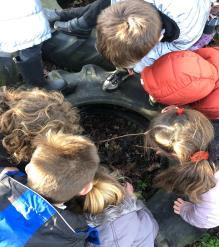
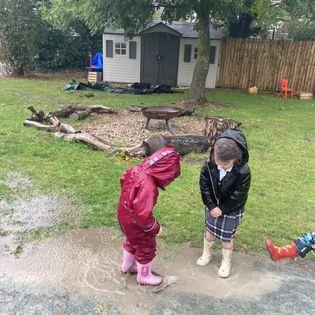
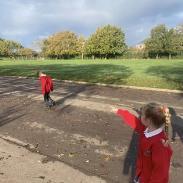
Year 2 - Study of the local area of Hambleton, identifying habitats and physical/human features. Using digital resources (VR) to explore Kenya and Antarctica and comparing weather and climates with Hambleton.
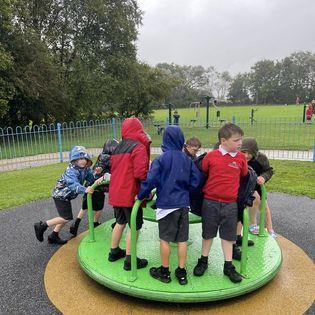
Year 3 - Study Rivers, visiting the River Wyre and using virtual resources to explore differing rivers. Conducting local interviews investigating the origin of our school food.
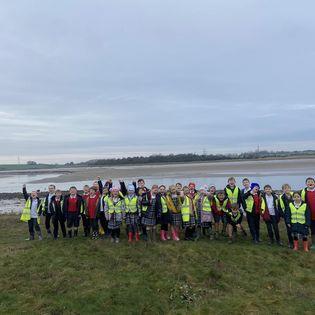
Year 4 - Study extreme geographical features (volcanoes and earthquakes) exploring our local area discovering different rocks. Virtual resources linked to exploring Antarctica and the Amazon Rainforest, comparing the climates to Hambleton.
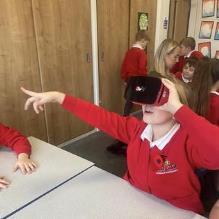
Year 5 - Study by using VR headsets to explore the Alps and the Mojave desert, compared to our local area, and conducting fieldwork data collections looking at local issues.
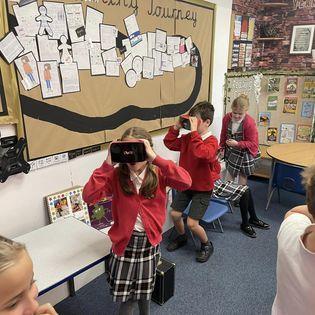
Year 6 - Studying coastal regions looking at the Ocean and beaches in Australia compared to Blackpool, visiting coastal areas and using digital VR to support investigations about energy sources in America. To create and investigate local enquiry fieldwork about a local issue.
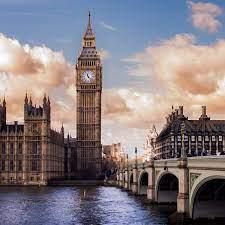
Targets:
To embed fieldwork skills across school to ensure children have a better familiarity with map work.
This will: Develop children’s confidence in maps. Broaden children’s knowledge in maps. Children to gain a better local and global knowledge. Provide more evidence of fieldwork in topic books. Cover all the learning objectives within the National Curriculum.
Update the Geography Curriculum to highlight where the specific fieldwork skills are. Providing a progression of map skills throughout the year groups.
To meet with HW to share progression of map skills and that map skills should be a focus of Picture News assembly.
Buy into the Teachers Collection to add Map themed texts into the curriculum.
To familiarise monitoring of EYFS expectations of geography in the early years.
This will: Boost confidence of being a subject leader. Better understanding of prior steps before children go to KS1. Help to understand what to look for when going into an Early Years classroom.
Select the correct texts and include them as part of the curriculum.
To share this with staff in particular new and KS2 staff.
Monitoring to include pupil voice
To meet with EYFS lead to unpick Early years curriculum and how it fits into the curriculum.
Look at the monitoring sheet for Early Years to familiarise myself as to what to look for when monitoring Early years, shadow Early years lead.
Share feedback with Early Years lead before sharing in staff meeting
Impact of Staff Training:
Subject Lead CPD
SGR has re-written the Geography Curriculum to highlight the key knowledge and steps.
Staff CPD
Subject Leader Development
SGR has fed back the new curriculum and the double page spread assessment tool. Working on developing a Geography exemplification document to help provide judgements for levels of support (QIG).
Assessment/Measuring Impact:
Assessment of geography is ongoing and is used to inform next steps in learning. This information comes from a variety of sources including questioning, discussion, observing as well as children’s recorded work.
• Planning and book scrutiny is carried out to ensure that all the skills are being taught effectively and to ensure that there is clear progress throughout the school (including, the comparison of double page spreads).
• A clear marking policy is used across the school.
• Pupil voice - through monitoring children are asked about what topics they have been learning about in geography, assess their understanding of physical and human geography. What aspects of the subject they have enjoyed.
Throughout all geography topics the pupils are assessed against the key skills taught and their knowledge and understanding of the subject. This is reported termly by the class teacher in our data captures, stating whether they are working at age related expectations, working at greater depth or working towards the expected standard. The data captures are used to monitor the progress of all cohorts as well as groups of pupils including pupil premium and SEND.
Children’s prior knowledge is assessed through geography questions, at the beginning of a lesson and at the end of a lesson through a challenge question.
Future Targets
• To imbed the curriculum throughout school.
• To facilitate the development of Digi-maps.
• To promote consistent fieldwork in all year groups.
